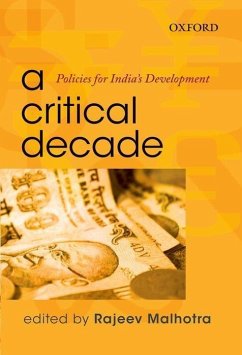Schade – dieser Artikel ist leider ausverkauft. Sobald wir wissen, ob und wann der Artikel wieder verfügbar ist, informieren wir Sie an dieser Stelle.
- Gebundenes Buch
- Merkliste
- Auf die Merkliste
- Bewerten Bewerten
- Teilen
- Produkt teilen
- Produkterinnerung
- Produkterinnerung
The essays in this volume, by senior-level policymakers, address medium-term policy imperatives for the Indian economy, covering both domestic developments as well as contemporary global economic issues that have implications for India.
Andere Kunden interessierten sich auch für
![Governance Governance]() Mark BevirGovernance17,99 €
Mark BevirGovernance17,99 €![Bureaucracy Bureaucracy]() Ludwig Von MisesBureaucracy21,99 €
Ludwig Von MisesBureaucracy21,99 €![Ethics in Fiscal Administration Ethics in Fiscal Administration]() Angela Pool-FunaiEthics in Fiscal Administration165,99 €
Angela Pool-FunaiEthics in Fiscal Administration165,99 €![The Enforcement Of The Statutes Of Labourers During The First Decade After The Black Death, 1349-1359 The Enforcement Of The Statutes Of Labourers During The First Decade After The Black Death, 1349-1359]() Bertha Haven PutnamThe Enforcement Of The Statutes Of Labourers During The First Decade After The Black Death, 1349-135946,99 €
Bertha Haven PutnamThe Enforcement Of The Statutes Of Labourers During The First Decade After The Black Death, 1349-135946,99 €![Continentalizing Canada Continentalizing Canada]() Gregory J InwoodContinentalizing Canada122,99 €
Gregory J InwoodContinentalizing Canada122,99 €![Against the Tide Against the Tide]() J Douglas HouseAgainst the Tide53,99 €
J Douglas HouseAgainst the Tide53,99 €![Parliamentary Debates Parliamentary Debates]() Parliamentary Debates46,99 €
Parliamentary Debates46,99 €-
-
-
The essays in this volume, by senior-level policymakers, address medium-term policy imperatives for the Indian economy, covering both domestic developments as well as contemporary global economic issues that have implications for India.
Produktdetails
- Produktdetails
- Verlag: Hurst & Co.
- Seitenzahl: 336
- Erscheinungstermin: 4. Mai 2012
- Englisch
- Abmessung: 216mm x 145mm x 36mm
- Gewicht: 658g
- ISBN-13: 9780198080138
- ISBN-10: 0198080131
- Artikelnr.: 35482116
- Herstellerkennzeichnung
- Libri GmbH
- Europaallee 1
- 36244 Bad Hersfeld
- gpsr@libri.de
- Verlag: Hurst & Co.
- Seitenzahl: 336
- Erscheinungstermin: 4. Mai 2012
- Englisch
- Abmessung: 216mm x 145mm x 36mm
- Gewicht: 658g
- ISBN-13: 9780198080138
- ISBN-10: 0198080131
- Artikelnr.: 35482116
- Herstellerkennzeichnung
- Libri GmbH
- Europaallee 1
- 36244 Bad Hersfeld
- gpsr@libri.de
Rajeev Malhotra is Economic Adviser, Office of the Finance Minister, Government of India. He is the principal author of the first National Human Development Report 2001 (Planning Commission and Oxford University Press, 2002).
* Tables, Figures, and Boxes; Foreword
* Introduction
* I. Macroeconomic Issues
* 1. Impossible Trinity Revisited: Lessons and Policy Implications for
India and Other Emerging Economies
* 2. Fiscal Policy Imperatives: Changing the Focus of Union Budget
* 3. Is India's Inflation Inflated?
* 4. Is India's Real Effective Exchange Rate in Line with Economic
Fundamentals
* II. Market Reforms, Productivity, and Sustainability
* 5. Financial Sector Reforms: Refining the Architecture
* 6. Financial Inclusion in Rural Areas and Micro-Finance: Issues,
Constraints, and Policy Options
* 7. Role of Competition Law and Policy in Making Markets Competitive
* 8. Does Privatization Lead to Benign Outcomes? The Indian Experience
and Policy Lessons
* 9. Accelerating Manufacturing Growth: Promise of the New
Manufacturing Policy and Beyond
* 10. Labour Laws: Are They Holding Back Manufacturing Sector Growth
and Employment in India
* 11. Breaking the Glass Ceiling: Unleashing the Potential of the
Informal Sector
* 12. Insurance as a Tool for Adaptation to Climate Change in India
* III. Infrastructure, Institutions, and Governance: Some Challenges
* 13. Managing India's Demographic Dividend: Policy Challenges in
Social and Urban Development
* 14. Social Protection for Inclusion
* 15. India's Road Concession Agreements: Issues, Challenges, Global
Experiences, and Lessons
* 16. India's Free Trade Agreements: Is it the Way Forward?
* 17. Improving Public Service Delivery: Building a New Aadhar
* Contributors
* Introduction
* I. Macroeconomic Issues
* 1. Impossible Trinity Revisited: Lessons and Policy Implications for
India and Other Emerging Economies
* 2. Fiscal Policy Imperatives: Changing the Focus of Union Budget
* 3. Is India's Inflation Inflated?
* 4. Is India's Real Effective Exchange Rate in Line with Economic
Fundamentals
* II. Market Reforms, Productivity, and Sustainability
* 5. Financial Sector Reforms: Refining the Architecture
* 6. Financial Inclusion in Rural Areas and Micro-Finance: Issues,
Constraints, and Policy Options
* 7. Role of Competition Law and Policy in Making Markets Competitive
* 8. Does Privatization Lead to Benign Outcomes? The Indian Experience
and Policy Lessons
* 9. Accelerating Manufacturing Growth: Promise of the New
Manufacturing Policy and Beyond
* 10. Labour Laws: Are They Holding Back Manufacturing Sector Growth
and Employment in India
* 11. Breaking the Glass Ceiling: Unleashing the Potential of the
Informal Sector
* 12. Insurance as a Tool for Adaptation to Climate Change in India
* III. Infrastructure, Institutions, and Governance: Some Challenges
* 13. Managing India's Demographic Dividend: Policy Challenges in
Social and Urban Development
* 14. Social Protection for Inclusion
* 15. India's Road Concession Agreements: Issues, Challenges, Global
Experiences, and Lessons
* 16. India's Free Trade Agreements: Is it the Way Forward?
* 17. Improving Public Service Delivery: Building a New Aadhar
* Contributors
* Tables, Figures, and Boxes; Foreword
* Introduction
* I. Macroeconomic Issues
* 1. Impossible Trinity Revisited: Lessons and Policy Implications for
India and Other Emerging Economies
* 2. Fiscal Policy Imperatives: Changing the Focus of Union Budget
* 3. Is India's Inflation Inflated?
* 4. Is India's Real Effective Exchange Rate in Line with Economic
Fundamentals
* II. Market Reforms, Productivity, and Sustainability
* 5. Financial Sector Reforms: Refining the Architecture
* 6. Financial Inclusion in Rural Areas and Micro-Finance: Issues,
Constraints, and Policy Options
* 7. Role of Competition Law and Policy in Making Markets Competitive
* 8. Does Privatization Lead to Benign Outcomes? The Indian Experience
and Policy Lessons
* 9. Accelerating Manufacturing Growth: Promise of the New
Manufacturing Policy and Beyond
* 10. Labour Laws: Are They Holding Back Manufacturing Sector Growth
and Employment in India
* 11. Breaking the Glass Ceiling: Unleashing the Potential of the
Informal Sector
* 12. Insurance as a Tool for Adaptation to Climate Change in India
* III. Infrastructure, Institutions, and Governance: Some Challenges
* 13. Managing India's Demographic Dividend: Policy Challenges in
Social and Urban Development
* 14. Social Protection for Inclusion
* 15. India's Road Concession Agreements: Issues, Challenges, Global
Experiences, and Lessons
* 16. India's Free Trade Agreements: Is it the Way Forward?
* 17. Improving Public Service Delivery: Building a New Aadhar
* Contributors
* Introduction
* I. Macroeconomic Issues
* 1. Impossible Trinity Revisited: Lessons and Policy Implications for
India and Other Emerging Economies
* 2. Fiscal Policy Imperatives: Changing the Focus of Union Budget
* 3. Is India's Inflation Inflated?
* 4. Is India's Real Effective Exchange Rate in Line with Economic
Fundamentals
* II. Market Reforms, Productivity, and Sustainability
* 5. Financial Sector Reforms: Refining the Architecture
* 6. Financial Inclusion in Rural Areas and Micro-Finance: Issues,
Constraints, and Policy Options
* 7. Role of Competition Law and Policy in Making Markets Competitive
* 8. Does Privatization Lead to Benign Outcomes? The Indian Experience
and Policy Lessons
* 9. Accelerating Manufacturing Growth: Promise of the New
Manufacturing Policy and Beyond
* 10. Labour Laws: Are They Holding Back Manufacturing Sector Growth
and Employment in India
* 11. Breaking the Glass Ceiling: Unleashing the Potential of the
Informal Sector
* 12. Insurance as a Tool for Adaptation to Climate Change in India
* III. Infrastructure, Institutions, and Governance: Some Challenges
* 13. Managing India's Demographic Dividend: Policy Challenges in
Social and Urban Development
* 14. Social Protection for Inclusion
* 15. India's Road Concession Agreements: Issues, Challenges, Global
Experiences, and Lessons
* 16. India's Free Trade Agreements: Is it the Way Forward?
* 17. Improving Public Service Delivery: Building a New Aadhar
* Contributors








